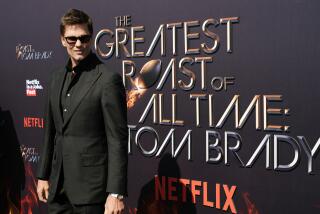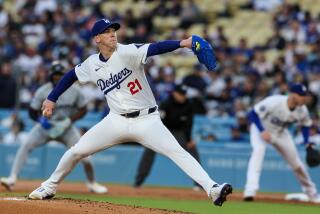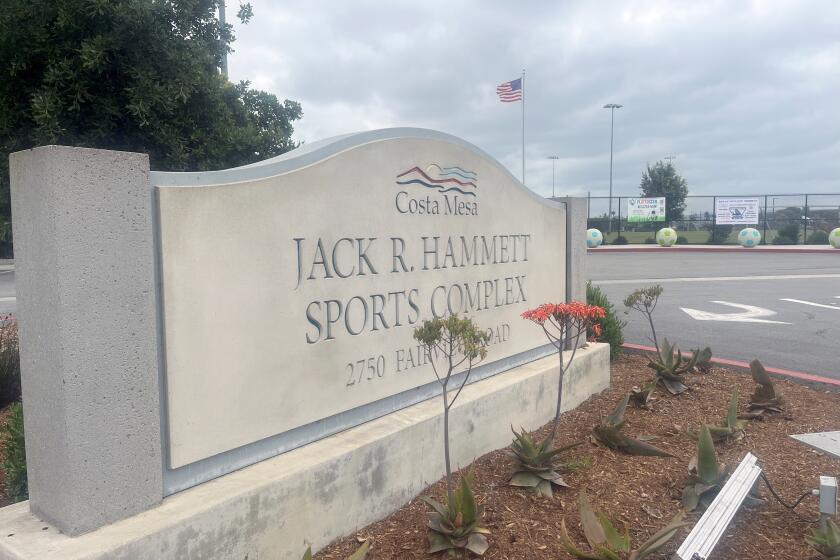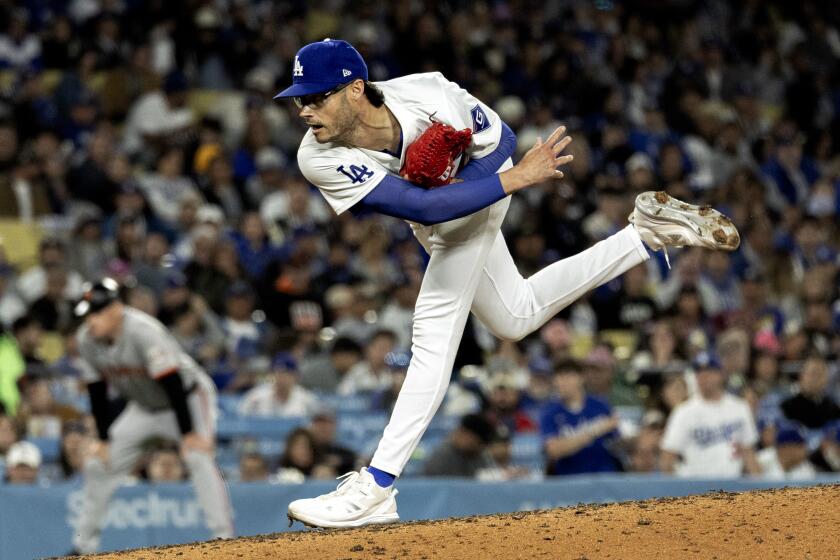Costa Goes Route on 66th
The temptation is to say that Albert Costa is simply Thomas Johansson with a better story.
Within moments of Johansson’s surprise title a few months ago at the Australian Open, commentators said the Swede had better enjoy it, because it would probably be his last Grand Slam title. A journeyman finally had his moment.
Sunday, those words were not said about Spain’s Costa, the 20th-seeded player who turned in a masterful clay-court performance in his first Grand Slam final, defeating his countryman, 11th-seeded Juan Carlos Ferrero, 6-1, 6-0, 4-6, 6-3, in 2 hours 30 minutes.
He took advantage of a 25-minute rain delay and returned from the break to win 11 consecutive games.
Costa, 26, has played like this before, only to have his nerves take over at crucial moments. But the birth of his twin daughters last year calmed him, and work with a sports psychologist prevented him from dwelling on the fact he had gone 65 tournaments without a title, since August 1999.
Sixty-six was the magic number for the humble Spaniard.
When Ferrero double-faulted on match point--his second serve sailed long--Costa dropped onto his back and nearly completed a backward somersault. Ferrero went over to Costa’s side and hugged him.
It was not like Johansson, who barely cracked a smile when he beat Marat Safin in the Australian final in January. Sunday was an emotion-filled day for Costa. Before receiving the winner’s trophy from former champion Guillermo Vilas of Argentina, Costa went into the stands, wisely using the stairs underneath the stadium, and hugged and kissed his entourage, holding up his infants, Claudia and Alma.
Costa is getting married Friday to the mother of his girls, Cristina, who beamed with pride Sunday as some other supporters cried for joy. “I couldn’t tell them anything, I just raised them in the air so that everybody could see them,” Costa said of his babies.
It is the fifth time a Spaniard has won a Grand Slam tournament in the Open era, preceded by titles by Andres Gimeno (1972 French Open), Manuel Orantes (1975 U.S. Open), Sergi Bruguera (1993 and 1994 French Open) and Carlos Moya (1998 French Open).
For years, Costa has been the best friend in waiting, watching the other Spaniards take the lead, win titles and garner headlines.
Of the 1994 final, Costa said: “I was watching Alberto Berasategui that day and Bruguera; I was so young. I was 18 years old. I was practicing with Alberto, and I said, ‘OK, if he’s in the final, why cannot I be in the final?’ I play good. I play almost like him.”
Those thoughts went through his mind again when Moya beat Alex Corretja (who will be Costa’s best man).
“Why not for me?” Costa asked.
He kept putting pressure on himself, and his ranking dropped from No. 26 at the end of 2000 to 40th at the end of last year.
“I was getting completely crazy in the court,” he said.
His attitude changed when his daughters were born.
“You start to think of other things,” he said. “Before tennis was 100% of my life, and now it is not. Now I have my two little babies that I love a lot. Sometimes when I lose a match, I think, ‘OK, I’m going home. I’m going to see my little babies, and I don’t get that drama, no?’ ”
Many assumed Costa would succumb to his nerves because it was his first Slam final. This was supposed to be time for the kid, 22-year-old Ferrero, to step forward.
But the other Slam final newcomer, Ferrero, was the shaky one, losing the first two sets in 46 minutes. Commentators began talking about this being one of the worst Slam finals.
Then Ferrero pulled himself together and turned it into a match. He won the third set and had opportunities to make the fourth interesting when he broke Costa to pull to 3-3. But Costa broke Ferrero’s serve at love in the next game, and Costa won the next two to close out the final.
Oddly enough, Ferrero mentioned his right ankle as a reason for not performing to his capability. He sprained it in practice before the second round, needing injections to continue although he hardly appeared bothered against Andre Agassi or Safin.
“I feel some pain in my legs, abductor and also my abdominal [muscles],” Ferrero said. “... I think this is all coming from my ankle because my ankle was not very good during the two weeks. I think this was the reason of all my pains.”
Costa’s drop shots--seven for winners--and tactical play may have been a reason for the world of pain. For Costa, it was the best match of his life. Humorously, he refused to trot out cliches.
“It’s tough to believe, but I feel very proud of myself,” he said. “And I’m very happy. I don’t like to say ‘dream come true’ because everyone says the same thing. But sometimes you think, ‘Oh, am I going to win or not? What’s going to happen?’ And now I did it. I’m convinced that I won in Roland Garros.”
*
(BEGIN TEXT OF INFOBOX)
Day 14 Highlights
Attendance: 15,385 (2001: 15,893)
Total Attendance: 348,039 (2001: 350,285)
Champions: Albert Costa beat fellow Spaniard Juan Carlos Ferrero, 6-1, 6-0, 4-6, 6-3, to win the men’s singles title. Spain’s Virginia Ruano Pascual and Argentina’s Paola Suarez beat Lisa Raymond and Rennae Stubbs, 6-4, 6-2, to win the women’s doubles title. Zimbabwe’s Cara Black and Wayne Black beat Russia’s Elena Bovina and the Bahamas’ Mark Knowles, 6-3, 6-3, to win the mixed doubles title.
Stat of the Day: 60--unforced errors made by Ferrero in the men’s final.
Quote of the Day: “The most difficult thing is to believe in yourself. For me, to believe that you can win. Now I’m believing.”--Costa after winning his first tournament title in nearly three years.
More to Read
Get our high school sports newsletter
Prep Rally is devoted to the SoCal high school sports experience, bringing you scores, stories and a behind-the-scenes look at what makes prep sports so popular.
You may occasionally receive promotional content from the Los Angeles Times.







